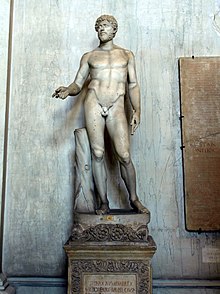Syphax of Numidia
| Syphax | |
|---|---|

Statue of a male in the Vatican museum, called "Syphax, King of Numidia".
|
|
| King of the Masaesyli | |
| Reign | c. 215 – c. 203 BCE |
| Successor | Vermina |
| Died | Tivoli, Italy |
| Spouse | Sophonisba |
| Issue |
Vermina Tanakwa |
Syphax was a king of the ancient Numidian tribe Masaesyli of western Numidia during the last quarter of the 3rd century BC. His story is told in Livy's Ab Urbe Condita (written c. 27-25 BC).
When in 218 BC, war broke out between Carthage and Rome, Syphax was initially sympathetic to the Romans. In 213 BC, he concluded an alliance with the Romans and they sent military advisers to help Syphax train his troops. He then attacked the eastern Numidians, the Massylians, ruled by King Gala; at that time allied to the Carthaginians. When Gala died in 206 BC, his sons Masinissa and Oezalces quarreled about the inheritance, and Syphax was able to conquer considerable parts of the eastern Numidian kingdom.
After the Roman general Publius Cornelius Scipio (Scipio Africanus) was victorious in the Battle of Ilipa (206 BC), he sent his friend Gaius Laelius to visit Syphax to ratify the treaty with Rome. Syphax however, refused to ratify any treaty except with Scipio, so Scipio sailed with two quinqueremes to meet with Syphax, taking a considerable risk in doing so. In fact he arrived at the Numidian harbor, at exactly the same time as Hasdrubal Gisco (who had fled from Spain) anchored there on his way back to Carthage. However, Scipio's ship managed to make harbor before Hasdrubal's seven triremes could make out to intercept them, and in a neutral harbor, Hasdrubal dared not act against the Romans. Syphax invited both to dinner, where both Syphax and Hasdrubal were taken in by Scipio's charm.
Meanwhile, Masinissa had concluded that Rome was winning the war against Carthage and therefore decided to switch sides. Having lost the alliance with Masinissa, Hasdrubal started to look for another ally, which he found in Syphax, sealing the alliance by offering his daughter Sophonisba in marriage, although until 206 BC she had been betrothed to Masinissa.
...
Wikipedia
